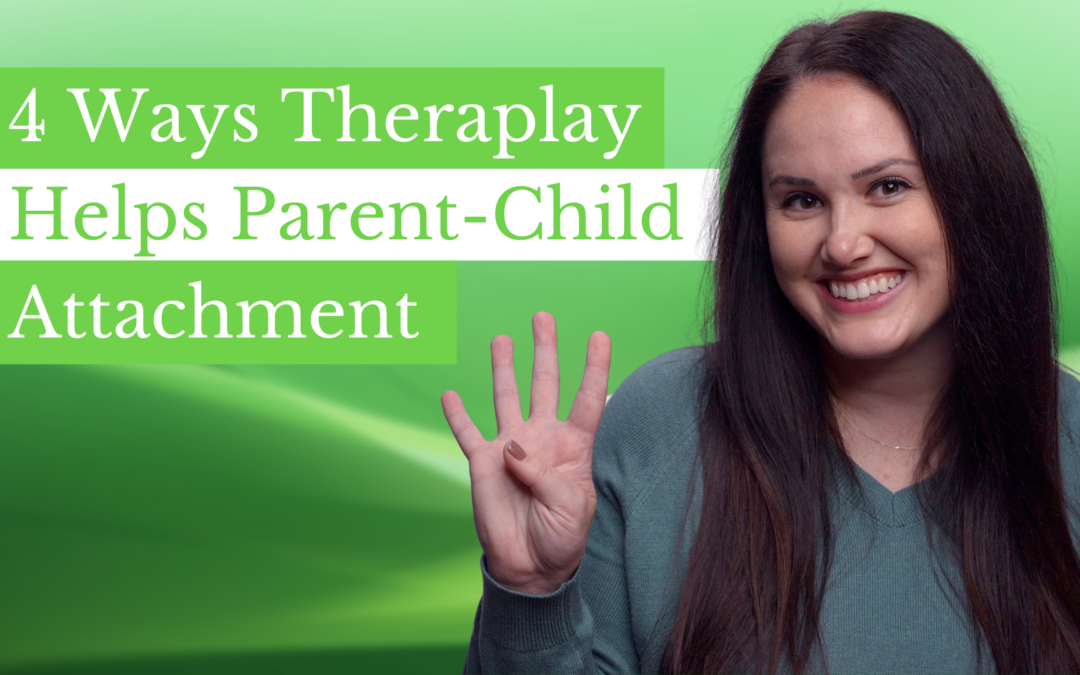Attachment is a crucial aspect of child development, influencing emotional regulation, self-esteem, and relationships. When attachment is disrupted or insecure, it can lead to various challenges, including anxiety, depression, and behavioral problems.
Theraplay addresses these concerns by focusing on enhancing the bond between you and your child through guided play sessions. These sessions are structured to be interactive and fun, encouraging positive engagement and emotional connection. Unlike traditional talk therapy, Theraplay involves activities that promote joyful and nurturing interactions.
Hi, I’m Taylor Simerly, a Child Therapist at Kid Matters Counseling, and in this article, I’m going to share some key benefits of Theraplay and how they nurture the parent-child attachment process.
First, Theraplay Enhances the Parent-Child Relationship Through Structure
Theraplay provides children with a sense of security through structure—predictable and consistent interactions led by the caregiver. This structured environment helps children learn that their caregivers are reliable and that they can trust them. Structure lays the foundation for emotional well-being and resilience.
For Example: A parent may engage their child in a playful but structured activity, such as taking turns balancing a small beanbag on their heads. By gently guiding the child and maintaining a predictable rhythm, the child feels a sense of safety and knowing what will happen next. This predictability fosters trust in the parent.
Second, Theraplay Enhances Emotional Regulation Through Engagement
In Theraplay, engagement is about using playful and attuned interactions to help children feel emotionally connected to their caregivers. By maintaining eye contact, playful tones, and engaging body language, parents encourage their children to express emotions and learn emotional regulation.
For Example: During a Theraplay session, the parent and child might play a game of “Emotion Charades,” where they act out different emotions. The parent enthusiastically mimics the child’s expressions, creating a sense of connection and encouraging the child to label and express their feelings. This game helps children learn to manage emotions in a fun and safe way.
Third, Theraplay Encourages Positive Behaviors Through Nurture
The nurture element of Theraplay focuses on providing caregiving moments that fulfill the child’s need for comfort and attention. Nurturing activities, such as gentle touch, praise, and reassurance, create an environment in which children feel valued and cared for. This promotes positive behaviors as children feel secure and confident.
For Example: A parent might offer a nurturing activity like softly brushing the child’s hair or gently massaging their hands during a calming moment. This nurturing touch helps the child feel loved and cared for, reducing stress and promoting cooperation. As a result, children become more open to following instructions and exhibiting positive behaviors.
Fourth, Theraplay Strengthens Family Bonds Through Challenge
Theraplay uses challenge in playful ways to help children build confidence and resilience. By introducing small, manageable challenges, children learn to trust their abilities and build positive relationships with their caregivers, who support and encourage them throughout the process.
For Example: A parent and child might play a cooperative game where they attempt to build a tower of blocks together. The parent provides gentle guidance but allows the child to take the lead. When the tower topples, the parent responds with encouragement, framing it as an opportunity to try again. This activity strengthens the bond between parent and child, teaching the child that challenges can be faced together.
Theraplay isn’t solely focused on the child—it’s a family-centered approach that involves both the parent and child. Through structure, engaging, nurturing, and challenging activities, Theraplay helps strengthen the emotional connection between you and your child.
It promotes secure attachment, emotional regulation, positive behaviors, and resilience.
If you’re concerned about your child’s emotional and behavioral well-being, consider scheduling an appointment with us today. Let’s work together to build a stronger, more connected family.

Taylor Simerly
Child Therapist
Utilizing a strengths based approach, I can help your child explore positive tools so they feel empowered and supported every step of the way.
New Clients Call: (855) 586-1802
Current Clients: (855) 543-7687
Ask Us Anything!
We help anxious kids and frustrated parents. We serve Hinsdale & the Western Suburbs of Chicago.
Made with ♥︎ in Hinsdale, Illinois for Chicago
Built By Brand Your Practice.
Kid Matters Counseling, P.C. DISCLAIMER: This website and blog are for informational, educational and general discussion purposes only. It is understood that no guarantee or warranty arises from the information provided, discussed or commented upon in this website and blog nor does it constitute legal or other professional advice on any subject matter. Access to this website and blog is voluntary and at the sole risk of the user. If you think that you have a medical emergency (including clinical), call your doctor or 911 immediately. A licensed medical professional should be consulted for diagnosis and treatment of any and all medical conditions. While the information contained within this website and blog is periodically updated, no guarantee is given that the information provided is correct, complete, and/or up-to-date. See our complete Privacy Policy and Terms of Service.





